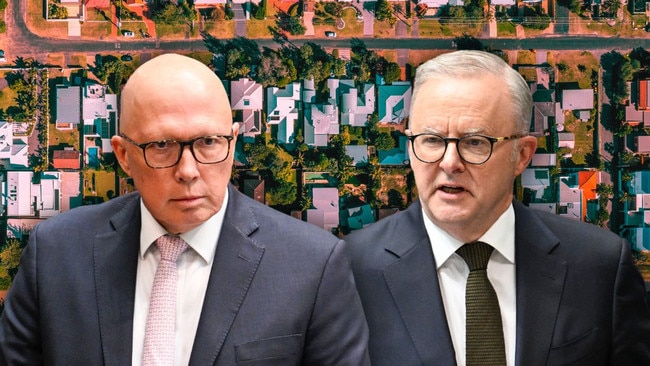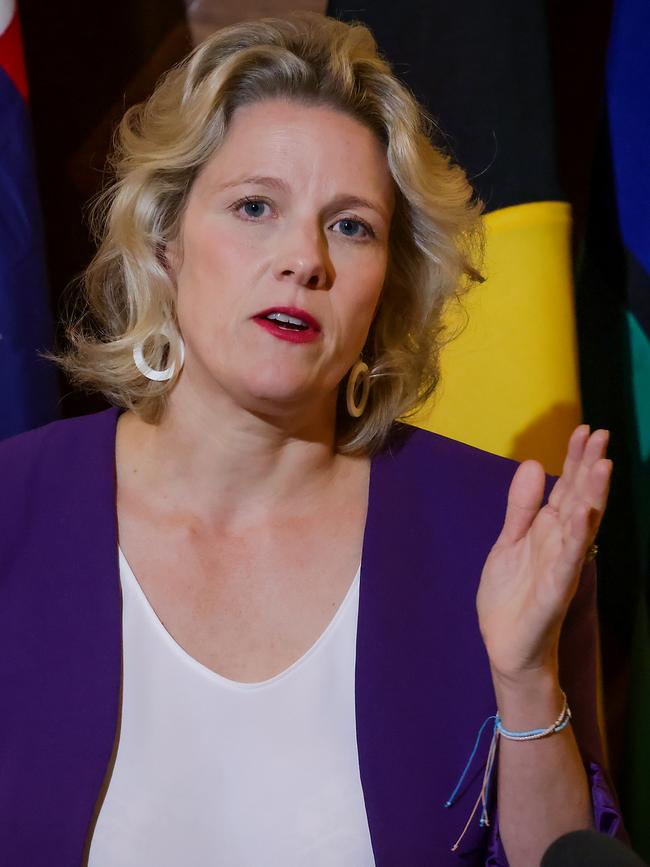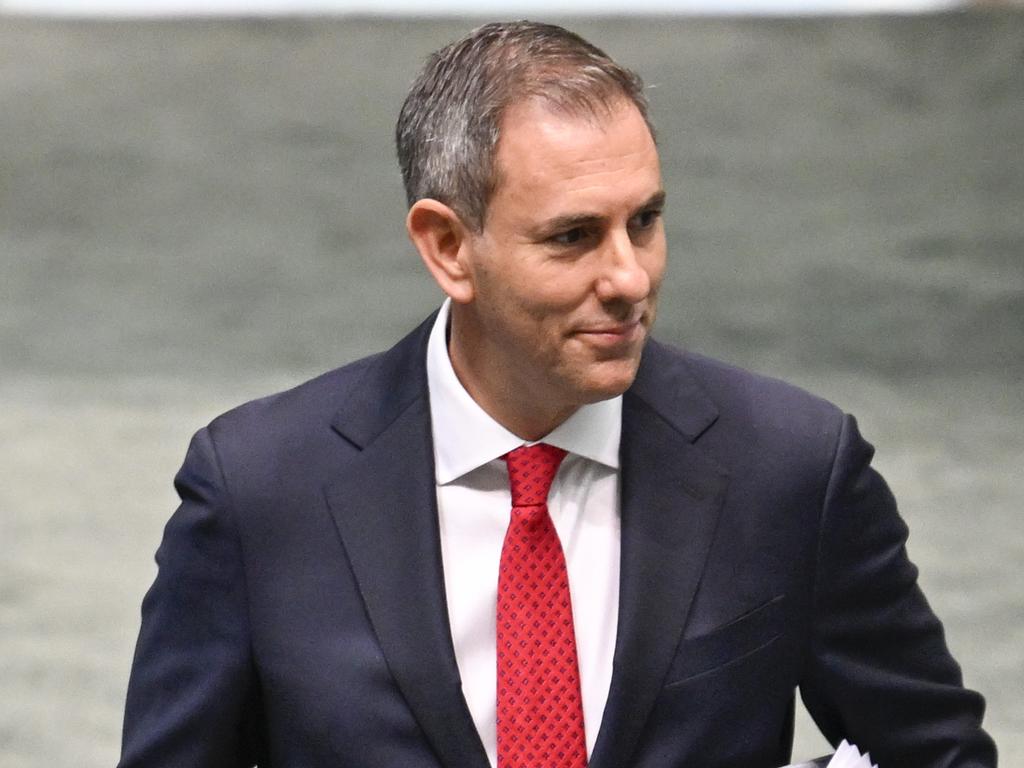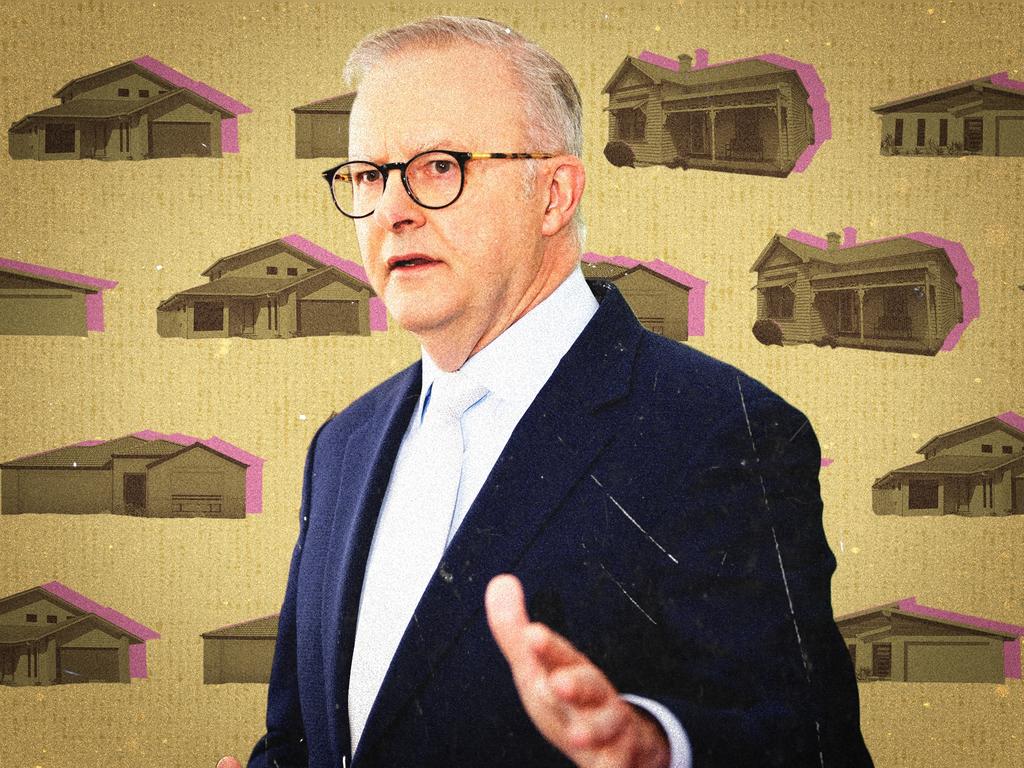Cap rates for new homebuyers: biggest builders and property owners launch pre-election push
Australia’s biggest builders and property owners are pushing Anthony Albanese and Peter Dutton to cap rates for first-home buyers under a new scheme to solve the housing crisis.

Australia’s biggest builders, property owners and investors have launched a pre-election push for Anthony Albanese and Peter Dutton to cap interest rates for first-home buyers under a new scheme that limits deposits to 5 per cent for new homes or apartments.
In a major intervention on the eve of the Reserve Bank’s first board meeting of the year, the Property Council of Australia on Monday will release its federal election platform headlined by a proposal to establish a first-home buyer accelerator loan scheme.
With the Prime Minister and Opposition Leader locked in a big spending election fight over how to fix the housing crisis, the scheme would involve banks charging a capped interest rate, backed by a government guarantee to support the lender.
The call came as Labor launched a crackdown on housing purchases by foreign buyers, implementing a two-year ban on the purchase of established homes by temporary residents to replicate a previous commitment by the Coalition.
The Productivity Commission on Monday will also call for quicker housing approvals and more labour market flexibility to deal with a 53 per cent collapse in physical productivity in the nation’s residential housing sector.
Property Council chief executive Mike Zorbas, who represents more than 2300 companies, investors, designers, builders and banks including Mirvac, Stockland, QIC, Lendlease, Brookfield, CBA and ANZ, said the interest rate cap would give first-home buyers a “realistic chance at accessing finance for housing”.
Amid hopes inside the government that the RBA will cut the 12-year high 4.35 per cent cash rate on Tuesday and lay the foundations for an election campaign, Mr Zorbas said “our proposal will help first-home buyers save up to $1087 every month and $13,044 annually”.
“This policy requires zero upfront government spending and would be subject to appropriate credit checks and serviceability assessments, meaning future exposure will be minimal. The scheme should be targeted, regularly reviewed and applied where it is driving new supply. Done right, it will help thousands of Australians onto the property ladder,” Mr Zorbas said.
“With cost-of-living pressures and housing affordability consistently the two issues of most concern for Australians, the government can and should use its balance sheet to support first-home buyers and the delivery of new homes.”
The Property Council proposal in its “A pro-cities, pro-investment agenda” election blueprint suggests the cap would be set at “either the official RBA cash rate or 5 per cent, whichever is greater, for a period of five years”.
The average variable mortgage rate is currently 6.51 per cent.
The “targeted and temporary” support program would help first-home buyers gain equitable access to credit and increase new home builds, which would help Labor get closer to achieving its 1.2 million new homes by mid-2029 target.
A suggested model for federal governments to adapt is a pandemic-era SME guarantee scheme, which would underwrite banks to provide more loans for first-home buyers and new homes.
The Covid program, which ensured a 50 per cent guarantee for participating lenders, provided SMEs, sole traders and not-for-profits with additional funding to help them through the pandemic.
The Property Council’s suggested scheme would be available only to first-home buyers, owner-occupiers and new builds.
If the homebuyer sells the home within five years, the interest rate reverts to a lender’s standard variable rate.
The standard variable rate would be applied five years after settlement.
Property Council members are among the nation’s largest investors, owners and builders of homes, retirement villages, shopping centres, offices, industrial precincts, schools, hospitals, hotels and hospitality venues.
The industry represents 13 per cent of the nation’s GDP, employs 1.4 million Australians and generates more than $106bn in tax revenues.
Amid warnings from construction and housing groups that Labor’s 1.2 million new homes target is not on track, the Albanese government has ramped up its housing focus in recent weeks.
Both Mr Albanese and Mr Dutton are understood to have held back additional housing policies, which will be rolled out during the imminent election campaign.
In addition to Labor’s $32bn Homes for Australia election plan, Jim Chalmers last week instructed financial regulators and the banks to soften home-lending rules for millions of Australians with university debts and smaller developers who can’t guarantee “100 per cent pre-sold apartments”.
Mr Albanese last month announced a re-elected Labor government would provide $10,000 cash incentives to boost building apprentice completion rates and help reverse ongoing tradie workforce shortages.
And Housing Minister Clare O’Neil on Sunday unveiled a new ban that will take effect on April 1 and last until March 31, 2027, and will prohibit any foreign investor or foreign-owned company from purchasing an existing dwelling.

While a number of rules already restrict foreign purchases of existing housing stock, Labor’s proposed ban will also include people temporarily living in Australia, such as international students or short-stay migrant workers.
Simultaneously, the Albanese government will also conduct a review into the ban’s effectiveness to determine whether it should be extended or made permanent, with the Australian Taxation Office set to be granted $5.7m in additional funding over four years to enforce the ban.
When Mr Dutton unveiled a similar measure following the May budget last year, housing experts were generally sceptical given foreign-bought dwellings account for less than 2 per cent of the housing stock.
The Property Council is calling for election commitments to double the $3bn performance-based New Home Bonus and $500m Housing Support Program for states and territories that “surpass their targets under the National Housing Accord”.
To help unlock more than 40,000 new homes, the industry wants a Housing Accord-related fast-track pathway for Environment Protection Biodiversity and Conservation assessments “with dedicated resources, experts and agreed decision-making time frames for applications”.
Since May, Mr Dutton has made a series of big-spending housing commitments including $5bn for enabling infrastructure to unlock up to 500,000 homes.
He has committed to a 10-year freeze on further changes to the National Construction Code, a two-year ban on foreign investors and temporary residents purchasing existing homes, and immigration cuts to free up more than 100,000 additional homes over five years.
The Coalition has also proposed allowing first-home buyers to withdraw 40 per cent of their superannuation savings – up to $50,000 – to assist in the purchase of a property. The PC will say on Monday that while governments were rightly focused on relaxing planning restrictions to bolster the supply of new dwelling stock, Commission chair Danielle Wood said reducing the cost and time taken to complete new builds was also a pressing priority.
“Lifting the productivity of homebuilding will deliver more homes, regardless of what is happening with the workforce, interest rates or costs,” she said.
Additional reporting: Jack Quail






To join the conversation, please log in. Don't have an account? Register
Join the conversation, you are commenting as Logout